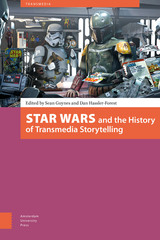2 books about Star Wars

Fan Phenomena
Star Wars
Edited by Mika Elovaara
Intellect Books, 2013
In October 2012, the Walt Disney Company paid more than $4 billion to acquire Lucasfilms, the film and production company responsible for Howard the Duck. But Disney, despite its history and success with duck characters, wasn’t after Howard; in buying Lucasfilms, it also bought the rights to the Star Wars franchise. Soon after the purchase, Disney announced a new Star Wars film was in the works and would be released in 2015, nearly four decades after the first movie hit big screens around the world and changed popular culture forever.
The continued relevance of Star Wars owes much to the passion of its fans. For millions of people around the world, the films are more than diversions—they are a way of life. Through costumed role-playing, incessant quoting, Yoda-like grammatical inversions, and scholarly debates about the Force, fans keep the films alive in a variety of ways, and in so doing, add to the saga’s cultural relevance. The first book to address the films holistically and from a variety of cultural perspectives, Fan Phenomena: Star Wars explores numerous aspects of Star Wars fandom, from its characters to its philosophy. As one contributor notes, “the saga that George Lucas created affects our lives almost daily, whether we ourselves are fans of the saga or not.” Anyone who is struggling to forget Jar Jar Binks can certainly agree to that.
Academically informed but written for a general audience, this book will appeal to every fan and critic of the films. That is, all of us.
[more]

Star Wars and the History of Transmedia Storytelling
Edited by Sean Guynes and Dan Hassler-Forest
Amsterdam University Press, 2018
Star Wars has reached more than three generations of casual and hardcore fans alike, and as a result many of the producers of franchised Star Wars texts (films, television, comics, novels, games, and more) over the past four decades have been fans-turned-creators. Yet despite its dominant cultural and industrial positions, Star Wars has rarely been the topic of sustained critical work. Star Wars and the History of Transmedia Storytelling offers a corrective to this oversight by curating essays from a wide range of interdisciplinary scholars in order to bring Star Wars and its transmedia narratives more fully into the fold of media and cultural studies. The collection places Star Wars at the center of those studies’ projects by examining video games, novels and novelizations, comics, advertising practices, television shows, franchising models, aesthetic and economic decisions, fandom and cultural responses, and other aspects of Star Wars and its world-building in their multiple contexts of production, distribution, and reception. In emphasizing that Star Wars is both a media franchise and a transmedia storyworld, Star Wars and the History of Transmedia Storytelling demonstrates the ways in which transmedia storytelling and the industrial logic of media franchising have developed in concert over the past four decades, as multinational corporations have become the central means for subsidizing, profiting from, and selling modes of immersive storyworlds to global audiences. By taking this dual approach, the book focuses on the interconnected nature of corporate production, fan consumption, and transmedia world-building. As such, this collection grapples with the historical, cultural, aesthetic, and political-economic implications of the relationship between media franchising and transmedia storytelling as they are seen at work in the world’s most profitable transmedia franchise.
[more]
READERS
Browse our collection.
PUBLISHERS
See BiblioVault's publisher services.
STUDENT SERVICES
Files for college accessibility offices.
UChicago Accessibility Resources
home | accessibility | search | about | contact us
BiblioVault ® 2001 - 2024
The University of Chicago Press









